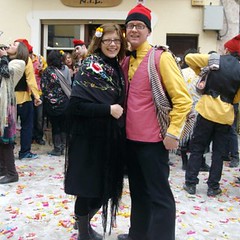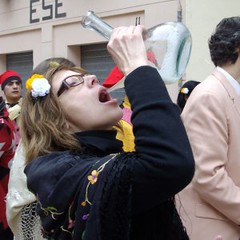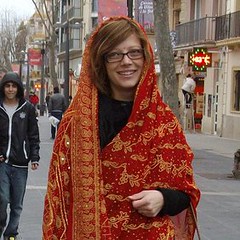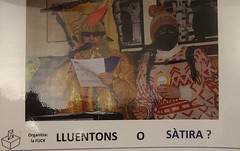After five rounds as a more and more interested observer, I this year took the step to participate in the carnival of Vilanova i la Geltrú. When I look back on this extremely non-Swedish festivity, I feel happy for having been accepted, but also pleased to have taken part in building the traditions of my adopted hometown.
To suggest that I have contributed is not to exaggerate. The carnival here is not a media event. Local TV covers it in all its aspect but not, in the first place, with the objective to inform the uninitiated, but rather as a tribute to the active participants. The typical carnival experience stems from what you and your friends plus the rest of your carnival society do together and usually does not attract any attention outside that circle. But everyone knows that during these few days similar celebrations and happenings take place around the city, and therein lies the greatness.For the same reason, I would argue that there are no shortcuts for those who want to live this atmosphere. True, there are carnival societies which allow outsiders to sign up, for example, for their comparsa, but how fun can that be if you do not have any relationship with the people with whom you dance around, nor with those to whom you throw candy when you pass them by in the streets?
To suggest that I have contributed is not to exaggerate. The carnival here is not a media event. Local TV covers it in all its aspect but not, in the first place, with the objective to inform the uninitiated, but rather as a tribute to the active participants. The typical carnival experience stems from what you and your friends plus the rest of your carnival society do together and usually does not attract any attention outside that circle. But everyone knows that during these few days similar celebrations and happenings take place around the city, and therein lies the greatness.For the same reason, I would argue that there are no shortcuts for those who want to live this atmosphere. True, there are carnival societies which allow outsiders to sign up, for example, for their comparsa, but how fun can that be if you do not have any relationship with the people with whom you dance around, nor with those to whom you throw candy when you pass them by in the streets?
The Challenge (el Repte)
Because it is on 'Shrove Thursday' (dijous gras, i.e. not Shrove Tuesday) everybody gets carnival crazy. This particularly applies to the children and for our family the days of calm are now over. Dijous gras in Vilanova comes with meringue throwing (merengada) and our six year old who was still hesitant last year, was now totally thrilled about throwing meringue batter. Not only that - he immediately found a few classmates in the crowd and would have stayed much longer if it had not been for his visiting Swedish grandparents who, almost disgusted, said that it was time to go home.
With my parents here as babysitters, that same evening, I was able to sneak out to the xatonada by the Bordegassos; a dinner where you eat the - with Swedish eyes - absolutely politically incorrect xató salad (containing both cod and tuna – how good for these threatened species that catering kitchens skimp on them and above all supply lettuce), followed by three kinds of omelettes (truita). If Tuesday had been the night when I personally felt that I had been absorbed by the carnival, this evening I received proofs that this was the case: More or less evil and sexually orientated songs had been written about all dinner participants and I certainly was not forgotten. Neither did I escape from having a dessert meringue squeezed in my face. Not that it mattered much because I (like many others) had put on old clothes, but it was a bit surprising since we were still indoors when it happened.
With my parents here as babysitters, that same evening, I was able to sneak out to the xatonada by the Bordegassos; a dinner where you eat the - with Swedish eyes - absolutely politically incorrect xató salad (containing both cod and tuna – how good for these threatened species that catering kitchens skimp on them and above all supply lettuce), followed by three kinds of omelettes (truita). If Tuesday had been the night when I personally felt that I had been absorbed by the carnival, this evening I received proofs that this was the case: More or less evil and sexually orientated songs had been written about all dinner participants and I certainly was not forgotten. Neither did I escape from having a dessert meringue squeezed in my face. Not that it mattered much because I (like many others) had put on old clothes, but it was a bit surprising since we were still indoors when it happened.
The night ended in plaça de les Cols with the merengada for adults and I have to admit to myself that I have come a long way in my integration. I am not any longer amazed to see around 200 Vilanova inhabitants, from nine different organizations, gathering in a square to - at and dressed in rain coats - start throwing sticky meringue batter on each other. Not only that, I found it all highly amusing and am inclined to come back next year. But then I will be braver: la merengada is not an indiscriminate fight, but rather an opportunity for you to smear meringue in the face of your acquaintances. If you do not know many people, and if you do not attack your friends, you can (almost) stand in the middle of the square without getting hit. Since that night the thermometer dropped below zero, I was pretty grateful not to be as soaked as some of my fellow Bordegassos.
L'Arrivo - the Arrival of the Carnival King
On the Friday we celebrate the arrival of the Carnival King (Sa Majestat Carnestoltes): l'Arrivo. In the afternoon, all Vilanova schoolchildren march around in the town as masqueraders - so also ours - and in the evening we have what comes the closest to a carnival parade as Swedes picture it, that is, society after society walking or dancing to music.
Bordegassos had chosen the theme "Winter Olympics 2022 to Vilanova-Montgros" (Montgros is the highest of the low hills north of our town.) as a paraphrase to Barcelona’s official, but almost as odd, candidacy for these games, in cooperation with ski resorts in the Catalan Pyrenees. Like most of the participating companies, we did not have any choreography, and our winter clothes were simply what everyone had found at home. The carnival of Vilanova (in contrast with that of our neighbour town Sitges) is not about beauty and glamour with international credentials, but is primarily an opportunity to joke about local events and mock the politicians. In that sense, the Arrivo parade has more in common with, for example, the satiric revues performed around New Year’s Eve in many places in
The final stop of the parade was the plaça de la
The Day of the Masqueraders (Mascarots)
Carnival Saturday is the day of free fancy dressing in Vilanova and after having lived here for five years our family finally did so; we tried to look like (Asian) Indians. I put on my costume already in the morning, which, on this day, it is quite normal among the town’s shopkeepers. In the afternoon we all went to celebrate and dance in the children's school, but it did not turn out very well. The six year old just wanted to run around with his classmates and our four year old more than anything wanted to go home. Here I have already made up my mind: next year I will sing along and learn the songs in Catalan although my sons refuse to understand what we adults think is fun for children.
Rambla, in spite of the cold and the very few spectators.
The Candy War of Vilanova
Sunday is the main carnival day in Vilanova. For my wife and me, this was our first time as a couple in a comparsa (carnival society), but despite that, we followed the tradition and exchanged gifts before we set off towards the clubhouse of the Bordegassos. Once there, I got help to tie my scarf (mocador) so that it could be filled with boiled candy (caramels) and then we all took to the streets. During the first round (primera ronda) of the day, the streets are virtually empty the only ones you happen to dance past are some of the other (in total over 80) comparses who have also come out. After a late breakfast, when the second round begins, however, the town is packed with people. While we danced to el Turuta, my wife kindly handed over candy to eager children, while I was looking for acquaintances in the crowd and immediately threw candy on everyone I recognized.
highlight of the day – the candy war in plaça de la
comparses organize a late lunch, followed by music and dancing. My wife went home to be with our children so I was the only one to join the other Bordegassos. It is worth pointing out that I, a Swede, definitely belonged to the more sober half of those present at the table, although - as we have learned - southern Europeans do not drink to become drunk.
Vidalet i paperets
Monday is a local holiday in Vilanova, to give the adults a rest after the comparses and the children time to prepare for Vidalet, a carnival parade with loads of confetti (paperets). My idea was to “recycle” our outfits as Indians, but after heavy negotiations I agreed that we could be pirates instead. Our sons were excited to dress up again so it was a bit of an anticlimax when we realized that it was drizzling outside. To make things worse, our eldest son's friends must have chosen to stay home because he found very few children whom he knew. When our youngest son started to complain that he was cold, I decided that we had had enough for the day. For Swedes living in Sweden Brazil Mediterranean it is winter. The sun does not always shine just because we live near Barcelona
Vilanova - the Catalan Alternative
On carnival Tuesday (Mardi Gras or Shrove Tuesday) the schools of Vilanova are still closed, despite the fact that our carnival program is anything but demanding. While Sitges is gearing up for its main parade, the Rua de l'Extermini, Vilanova is looking for a new core event since the old Vidalot tradition has died out. This year, the Federation of Carnival Association (FAC), reintroduced a couple of giants from the late 19th century – a well thought through initiative in my eyes. On the one hand, it further links the carnival of Vilanova with Catalan folkculture and, on the other, provides us a with a wonderful reminder of summer and Festa Major. Our children have already taken these giants (els gegants de la Cuyna Vella) to their hearts, but personally I missed the satirical songs which we, last year on this day, sang to celebrate the so called Balaguer cannon. Certainly it is possible to combine these two ideas. What about singing for the giants?
L'enterro
On Ash Wednesday the party is over and the children, symbolically enough, go back to school. But barely had our sons returned home before I dragged them out to see the funeral ceremony for the Carnival King (l'enterro). This year it happened to be "my" carnival society, the Bordegassos, which organized it and I would gladly have helped out but, since my parents had left, had to accept my role as an active father. First we went to Vilanova's newly renovated theatre where el Rei Carnestoltes was lying in state, surrounded by weeping subjects and then we saw how he was carried through the town in a procession in which all parts of the Vilanova carnival were declared dead, i.e. for this year. My son were totally fascinated and wanted to come to the plaça de la Vila, where the king's last will would be read. Now, I felt that it was bedtime for them, so instead we walked home through the fish smelling streets. There is probably no Vilanova inhabitant who still respects the traditional forty days (quaresma) of lent, but on its first day many people have fried sardines for dinner.
"Tot s'hi val" and the Swede Who Blushed
The carnival is over and I start to digest my impressions. It truly is a time when everything is allowed ("per carnaval tot s'hi val") which, among other things, takes its expression in erect male sex organs and giant vaginas popping up everywhere. I consider myself a fairly open minded Swede, but must admit that several times I felt almost embarrassed, especially when I had my small sons with me. During l’enterro we were fortunate to arrive too late to get the highly realistic chocolate willies which the Bordegassos handed out, but saw many other Vilanova children walk around with them in their mouths. For how many minutes would something similar be allowed to go on inSweden
The carnival is over and I start to digest my impressions. It truly is a time when everything is allowed ("per carnaval tot s'hi val") which, among other things, takes its expression in erect male sex organs and giant vaginas popping up everywhere. I consider myself a fairly open minded Swede, but must admit that several times I felt almost embarrassed, especially when I had my small sons with me. During l’enterro we were fortunate to arrive too late to get the highly realistic chocolate willies which the Bordegassos handed out, but saw many other Vilanova children walk around with them in their mouths. For how many minutes would something similar be allowed to go on in
Then I will make sure to catch what I missed this time: If my wife wants, we will start with a dinner followed by dance (ball de mantons). I want to see at least one performance of ball de malcasats and take our sons to watch the crazy Moixó Foguer. If I have the time, I want to learn the steps of the Vilanova dances. And I will ensure to have a babysitter on the Monday so that I join the choir of the Bordegassos (coros), although I cannot sing. It was only thanks to my parents’ visit that I, this time, was able to experience as much as I could, so I hope that they are prepared to come back.
Until then, we have other things to discover. Next week the Bordegassos being to practice building human towers (assajos) and from April and onwards we will perform in the squares of
Technorati tags: Barcelona, Carnival, Castellers, Catalonia, Garraf, Human Towers, Penedès, Sitges, Vilanova
Photo: Maite Gomà
The carnival of Vilanova does not, as you will understand by now, have any similarities with that of After the last candy war all
The
Late that night, my wife and I took a fast walk through the town centre. What really amazed an attention obsessed Swede like me, is how many people there were dancing and fooling around in our local
The
Photos: Maite Gomà
Dijous Gras
The elements of the carnival which have made the biggest impact on me are, not surprisingly, those which take place in closed societies. On my way from outsider to insider in Vilanova, one person now stands out: Jordi Ibañez. It was he who last summer (via YouTube) persuaded me to join the castellers team Bordegassos and on Tuesday last week, it was he who gave me a key role when the carnival society of the Bordegassos, according to tradition, challenged the town’s folk dance association (Agrupació the Balls Popular, or "Agrupa") with a view to the coming meringue war. Dressed to represent English stick dancers - some of the few Morris Men who are still around - we paraded through the town, and then I pretended to be a native speaker of English and read a defamatory speech, which piece by piece was translated into Catalan. Without planning it, I had been thrown into one of these events - small, but adding up to be the carnival of Vilanova - and that even before it had begun for real.













3 comments:
I can tell that you and your family enjoyed being closely involved in all the days of the carnival. That was really nice to read and I learnt a lot about what goes in in Vilanova over that time. I took our 8 year old son to the candy throwing event there on Sunday, though he didn't want to get up close in the main square. The day before my partner took him to Sitges. Both of these he liked, especially the huge number of sweets, and when someone threw them through the open window of our car as I drove through the town looking for a car park. I thought the atmosphere was fantastic in Vilanova and the drunkenness didn't seem a problem to me at all. We will certainly go back next year and maybe get closer to the action.
Hi Brett,
Your'e so right - I'm already looking forward to next year. Taking part in our carnival makes it so intense - a great feeling.
I feel a bit sad if my texts suggests that this festivity is somehow marked by drunkenness - that isn't at all what I wanted to say.
As always, people here might take a glass or two, but you never see people who are sick from drinking, something which - unfortunately - is quite typical for all Swedish celebrations.
You don't happen to be a "casteller", do you?
Hi Erik,
No, I wasn't saying that you were suggesting that "this festivity is somehow marked by drunkenness." It's just that some people (especially from outside this country) seem to think that these festivals are all about getting drunk, when we know that is not the case. The type of drunkenness you mention about Swedes is also sadly true about many Australians. Speaking of which, I do know of a casteller (apparently an Aussie named Fred) who lives in Torres del Foix and I think is a member of Els Verds in Vilafranca, but I am still yet to meeet him. Maybe that might be why you think I am a casteller, though I admire what they do greatly. It is surely one of the best aspects of Catalan culture.
Post a Comment